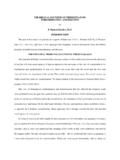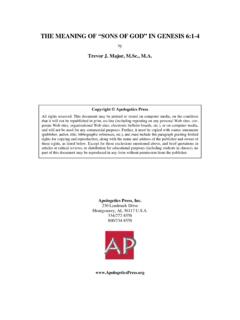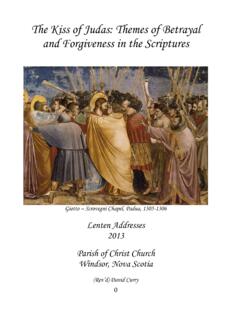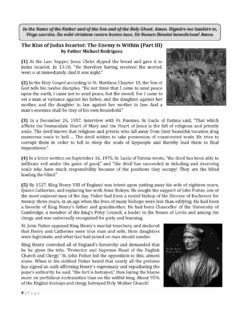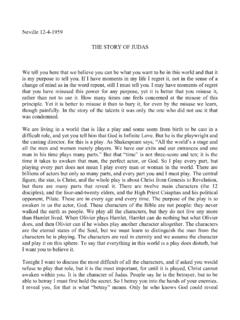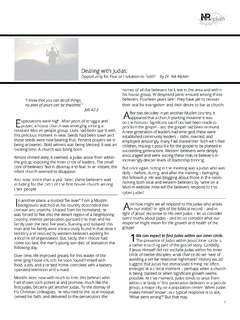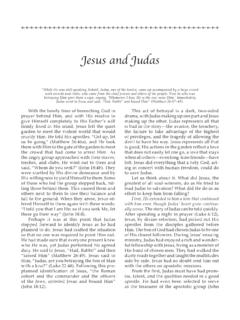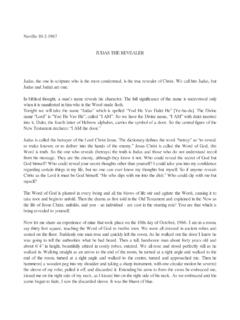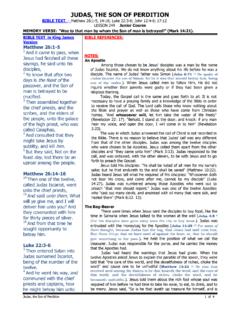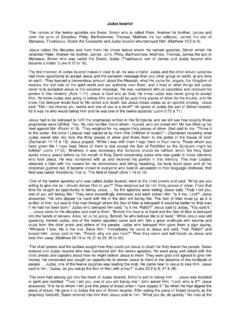Transcription of AN EXAMINATION OF ALLEGED CONTRADICTIONS IN THE …
1 AN EXAMINATION OF ALLEGED CONTRADICTIONS IN THE GOSPELS by F. Furman Kearley, THE IMPORTANCE OF THE PROBLEM The problem raised concerning ALLEGED CONTRADICTIONS in the Gospels, or for that matter, anywhere within the Bible, is a most serious one and deserves careful consideration. First, the doctrine of full or complete inspiration is at stake. How can the material be inspired of the Holy Spirit and at the same time contain CONTRADICTIONS ? Second, the authority and credibility of the Bible are being weighed in the bal-ances. If there are some errors that are apparent, there may be many others that are not.
2 If the Bible con-tains CONTRADICTIONS , then one could not trust the accounts recorded therein. Third, if the Gospels are not inspired and cannot be relied upon for accuracy, there is no way that men today can know with any cer-tainty what Jesus did, what He said, or if indeed He is Who He claimed to be. Fourth, if the Gospels are not inspired, and are not accurate historically, then the foundation of Christianity is destroyed since one would be unable to distinguish between what is of man and what is of God. L. Gaussen emphasized the importance of the problem when he wrote: First of all, we acknowledge that, were it true that there were, as they tell us, erroneous facts and contradictory narratives in the Holy Scriptures, one must renounce any attempt to maintain their plenary inspiration.
3 But we are not reduced to this: These ALLEGED errors do not exist (1949, p. 207). THE FAILURE OF ALLEGED CONTRADICTIONS IN HISTORY The first evidence to support Gaussen s assertion that ALLEGED errors do not exist is the fact that op-ponents of Christianity from the very earliest times have attempted to find CONTRADICTIONS in the Bible with Christian apologists in every age having met and refuted their arguments. The critics lack of success may be seen by noting the spread of Christianity and the increased circulation of the Bible in more than fifteen hundred languages, while the critics have died and their arguments now sit covered with dust on the shelves of libraries.
4 Every now and then, some critic revives an old ALLEGED contradiction, but all have been answered at one time or another. Gaussen briefly traced this conflict: - 2 -The Scriptures have in all ages had their adversaries and their defenders their Celsuses as well as their Origens their Porphyries as well as their Eusebiuses their Castellios, and their Calvins, their Strausses and their Hengstenbergs. It is now sixteen hundred years since Malchus Porphyry, that learned and spite-ful Syrian, who lived in Sicily under the reign of Diocletian, and whom Jerome calls radibum adversus Christum canem, wrote fifteen books the fourth of which was directed against the Pentateuch, the twelfth and the thirteenth against Daniel there was one (the first) entirely devoted to the bringing to-gether of all the CONTRADICTIONS which, he maintained, he had found in the Scriptures (1949, p.)
5 208). Arguments concerning ALLEGED CONTRADICTIONS in the Bible were advanced in the past history of the United States by men like Thomas Paine and Robert Ingersoll. Dynamic preaching and debating refuted them, with the result being the Great Awakening. Modern critics continue to document CONTRADICTIONS in the Bible, but these CONTRADICTIONS are being refuted just as those throughout history have been. ATTITUDE IS THE KEY Whether CONTRADICTIONS are seen in the Gospels, or whether harmony is observed among the four Gospels, is involved almost completely in the attitude of the individual reader toward the material.
6 If one is seeking to find CONTRADICTIONS , he can create them where they do not exist. An example will make this clear. One critic wrote: Ask yourself, did judas kiss Jesus to betray him or not? Mark-Matthew say that judas kissed Jesus. But Luke says that judas tried to kiss Jesus and did not make it. For John, there was no betrayal kiss at all. And, John underlines his point of view by adding that judas kept standing with the crowd (Lewis, 1972, p. 3). Listen to what Luke actually records, But Jesus said unto him, judas , betrayest thou the Son of Man with a kiss ?
7 (Luke 22:48). Luke nowhere says that judas tried to kiss Jesus but failed. The critic is so desirous of finding a contradiction that he is blind to what Luke said and puts other words into his mouth. The truth is that Luke does not record the completion of the act, but this in no way contradicts Matthew and Mark and in no way infers that the kiss did not take place. The critic again blindly inferred that John said there was no kiss . In truth, John simply omitted the entire matter and did not mention this act of betrayal. His omission of this detail in no way contradicts the other gospels any more than his omission to record the Sermon on the Mount constitutes a denial that the Sermon on the Mount was de-livered.
8 In truth, none of the Gospel writers records anywhere near all of the details of the Lord s minis-try. However, critics seize upon any imagined variation and cry, Contradiction! This is simply because - 3 -they want to find a contradiction, for they cannot stand the message of the Gospel and must attempt to overthrow its authority. In everyday life, one can observe how significant attitude is in approaching the evaluation of other men s words. If one person is hostile toward another, he constantly is picking over everything he says or does, and infers flaws and CONTRADICTIONS repeatedly when such really do not exist.
9 On the other hand, if one is favorably disposed toward another, he attempts to find harmony in everything the other person says or does. The sincere and honest method of approaching any such matters is to assume harmony and to grant honesty and credibility to others until the opposite is proved beyond a shadow of a doubt. The crit-ics, however, not only attempt to magnify slight variations in the Gospel accounts into CONTRADICTIONS , but frequently create problems where there are none by making or inferring statements that are not present in the text. Another example might illustrate the matter even more clearly.
10 One critic affirmed: Mark-Matthew say that Jesus prayed three times and each time came again to find his friends asleep. Luke says this happened only once John has no praying, no watching, no sleeping and no waking at all (Lewis, 1972, p. 4). A careful EXAMINATION of Luke 22:39-46 indicates that Luke never said This happened only once. What Luke does do is to abbreviate the account of the event in the garden. He records a part of Jesus prayer in verse 42, then clearly seems to indicate that Jesus prayed further by using the phrase (in verse 44), he prayed more earnestly.
